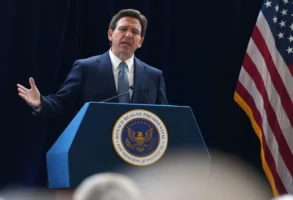Published April 13, 2015
The idea that left-liberalism now functions as a secular religion is not new. (I’ve taken it up, here, here, and here.) But where do this new religion’s adherents receive their dogma? Movies, music, and television are important, but the real answer is college. The conclusion I draw from the National Association of Scholars’ (NAS) latest report, “Sustainability: Higher Education’s New Fundamentalism,” is that many American colleges and universities have reverted to their 18th century mission. They have become divinity schools, training grounds for the new secular religion of left-liberalism, particularly its ecological variant.
Divinity schools are generally affiliated with a denomination. In the case of higher education’s “new fundamentalism,” that denominational affiliation is obviously the Democratic Party. This is what the NAS’s Sustainability Report won’t quite say (understandably, since NAS is a nonpartisan group). Yet it’s important to fill in this final step in the argument, because conservatives and Republicans still don’t get it. America’s colleges and universities are inculcating the eco-religion of “sustainability” as a roundabout way of turning their students into political partisans.
Between Obama’s ill-advised Iran deal, his unconstitutional immigration order, the chaotic Middle East, and any number of other policy kerfuffles, who has time to devote to “cultural” issues like the state of American higher education? When we do fix attention on campus follies like “trigger warnings,” it’s largely for amusement.
This is a mistake. Silly-seeming campus movements like fossil fuel divestment should be understood as more than mere policy proposals. Fossil-fuel divestment won’t likely happen and wouldn’t achieve its goal of shutting down America’s oil companies even if colleges did divest. Yet fossil-fuel divestment, like other aspects of the campus sustainability movement, is less about changing policy than about training minds, Democratic minds.
Sustainability activists are nominally critics of the Democratic Party. They march on Obama’s White House to force rejection of the Keystone pipeline, and occasionally work against Democratic officeholders unwilling to oppose projects like Keystone. Yet like Tom Steyer, who bankrolls their movement, campus sustainability activists are leading supporters of the Democratic Party and helped elect and re-elect President Obama. Harry Reid’s incessant railing against the Koch brothers during the run-up to the 2014 midterms, comic as it seemed, was a largely unsuccessful effort to push these young people to the polls. It didn’t work in 2014, but has a better chance of doing so in 2016, when some variant of an eco-scare campaign will surely be tried again.
If you want to see today’s Democrat divinity schools at work, have a look at Chapter 4 of the NAS “Sustainability” report, which explains how colleges nudge students to adopt a “sustainable” lifestyle and its accompanying ideology. Consider, for example, the widespread campus bans on bottled water. Supposedly, this is a simple step that a college can take to conserve resources and reduce waste. It will also strike many outsiders as a trivial issue. Yet campus bottled water bans are a form of practical ideological training by way of ritual self-abnegation. You forgo bottled water to prove your righteousness, rejecting in the process the pernicious folly of America’s economic system.
The NAS Sustainability Report highlights a popular eight-minute video (with over 3.5 million views) called “The Story of Bottled Water.” That video presents the underlying rationale of the bans. It depicts the American society as a “system in crisis,” driven to destructive consumerism by selfish and manipulative capitalists. Businesses allegedly use seductive advertising to “manufacture demand” for things we don’t need, bottled water among them.
The Story of Bottled Water’s take on “manufactured demand” is unconvincing. Supposedly, businesses have scared consumers into buying bottled water by making them suspect the quality of their tap water. It could just as easily be argued that it was environmentalists themselves who scared the public into distrusting tap water. In any case, New York City is famous for the quality of its tap water. Last time I checked, New Yorkers were buying plenty of bottled water.
Bottled water is a fair topic for debate, but universities have no business weighing in institutionally on the issue. In doing so, they are effectively endorsing the sort of anti-capitalism pushed by The Story of Bottled Water. A university taking a stand on an issue so peripheral to its mission effectively repudiates the idea of college as the home to rational inquiry and debate. Can anyone doubt which party the graduates of these finishing schools will prefer?
Here’s a quote from Jim Geraghty’s latest “Morning Jolt,” where he notes that Hillary Clinton begins with 183 electoral votes, however well or poorly she campaigns: “Credit the Democrats; they’ve built a political machine where the quality of candidate isn’t really a factor. Their base is going to show up and vote, no matter what.” The quality of candidate isn’t a factor, in part, because modern colleges and universities are churning out large numbers of graduates trained to treat Republicans as beyond the pale. Yet Republicans still don’t think of campuses as part of the Democratic political machine, and thus devote almost no time, thought, effort, or resources to fighting back.
While the battle for this country is far from lost, it’s high time that conservatives paid more attention to the supposedly fringe ideas now dominating our campuses, “sustainability” very much included. The fate of the bottled water industry is not at stake, but the minds and votes of a new generation of Americans are.
— Stanley Kurtz is a senior fellow at the Ethics and Public Policy Center.





